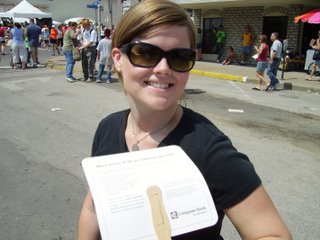
I was reading my friend Jon's blog the other day (http://ministryfuel.blogspot.com/) and in one of his more recent posts he cited an article published by Fuller Seminary in California. This particular article discusses how some churches are embracing "new urbanism," essentially moving the nucleus of ministry away from the confines of the church building and into the neighborhoods in which members of a local body lives; taking ministry to the people and not making them come to you. A revolutionary way of thining about the church. These new urbanism thoughts appear to be manifesting to faith based actions of service that introduce people to the Savior.
Philosophy of New Urbanism
Just following WW II suburbs were born, neatly dividing people by economic class and forcing them to drive everywhere -- to the market, to work and to church. Churches followed people into the suburbs and also adapted suburban development patterns, buying sizable plots of land, erecting a church and surrounding it with a surface parking lot. Churches then offered multiple programs to draw members, who drove to the site, leaving neighborhoods behind. The philosophy behind New Urbanism is a possible antidote to the isolation experienced by many churches and Christians.
Slaves to a 'Good Ole' Church Programming'
While some more progressive churches are embracing a new urbanism way of thinking, many still resist. Our church has little programming; in fact, I would say we only have 2 programs at our church. There is a Life Group ministry and a Children's Ministry. This model of church is based on some of Paul's writings in Acts - mainly house churches - and relies on the individual Life Groups from around the city to minister where they're located. Nearly every aspect of ministry develops from and flows out of serving in community and being servants to the people around you; literally taking ministry to the neighborhoods and the nations. This model of church demands that members of the body take responsibility for the ministry that needs to be done. If one is not willing to take initiative and ownership of ministering to the people around them, they may feel that they are not ministering to anyone or being ministered to. This change is scary to manyand has found critics.
The Human Desire for Community
As an undergraduate Advertising major I was often required to research marketing and branding strategies of various companies. Being obsessed with Starbucks like I am, I wondered how they had roped me and millions of other people in to their store time after time. One section of their annual report struck me as quite profound as it talked about the creation of "the third place." Starbucks set out to be everybody's third place, you know, the place you're at when you're not at home or the office; a place where you could come and experience a peaceful community with other persons enjoying a cup of joe. The report said that after much research they had found that many Americans desired a community of people to relate with other than family or co-workers. If Starbucks understands the importance of community, why don't most churches? Why is Starbucks more effectively creating community than most churches? What are they offering that the church doesn't?
Going to the Community
As my post is getting quite long I will just throw one last thought out to answer my last question from above. . .
Starbucks has put themselves on nearly every street corner in urban America; even my small, small hometown in northeast Kansas recently got a 'bucks. People go, I go, because it is totally convieneient for me. I never think to find a Coffee Beanary coffee store because there is only one where we live, but I drive by a dozen Starbucks during my work commute. If the members of local church bodies viewed themselves as the church and not the walls & steeple as the church, then perhaps more of our neighbors would encounter the love of Christ. And whether I'm in dumpy clothes or in my suite, I am appropriately dressed to feel comfortable at Starbucks. Please show me the scripture that says I have to dress up to corporately worship with other believers. Perhaps creating an environment where people feel safe to come as they are is more important than previously realized.
Concluding thoughts
I don't mean this post to be a slam to churches across the U.S. I am excited to see more churches embrace a model of ministry that can look beyond and embrace those outside of their buildings.

3 comments:
New Urbanism...Good concept! But is it really that "new?" Like you said, our church is very similar, but based on model of the early church in Acts. The early church was in the community. That's not so new, now that you think of it, is it?
I'll have to check out the other article!
while DCCF is doing ministry beyond the church walls (which is good, b/c our church isn't very pretty, haha), I think 'new urbanism'is still a very new concept to most across the country. . .the same people who embrace economic growth and change strongly resist that same change in their church. . . very interesting paradox.
I know people resist this way of thinking. I ran into that a lot in seminary. People resist A LOT of new ideas. Not just in church, but in the working world too (as seen in my workplace A LOT).
I think people are scared of change. Maybe we should start embracing it.
I read the article, and liked it, and forwarded it to some people I know interested in doing church in a new way.
Post a Comment